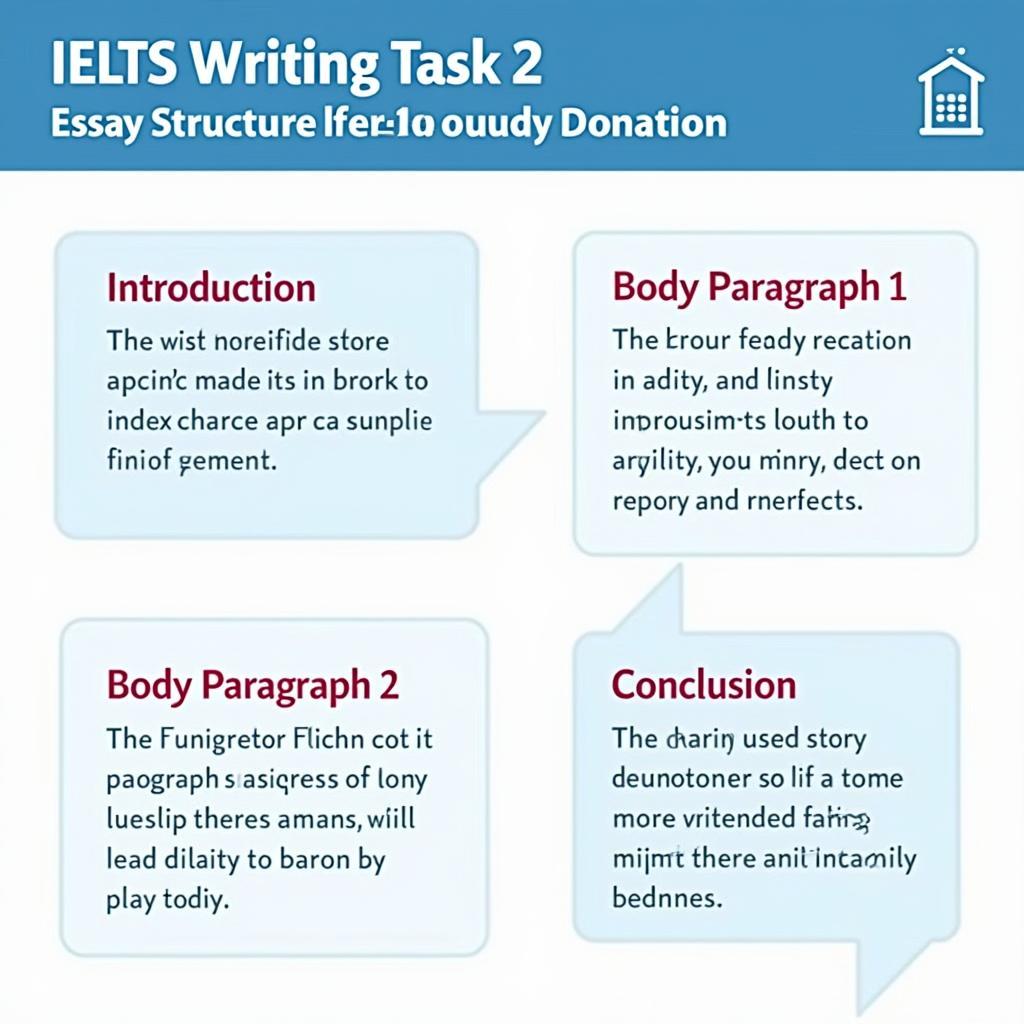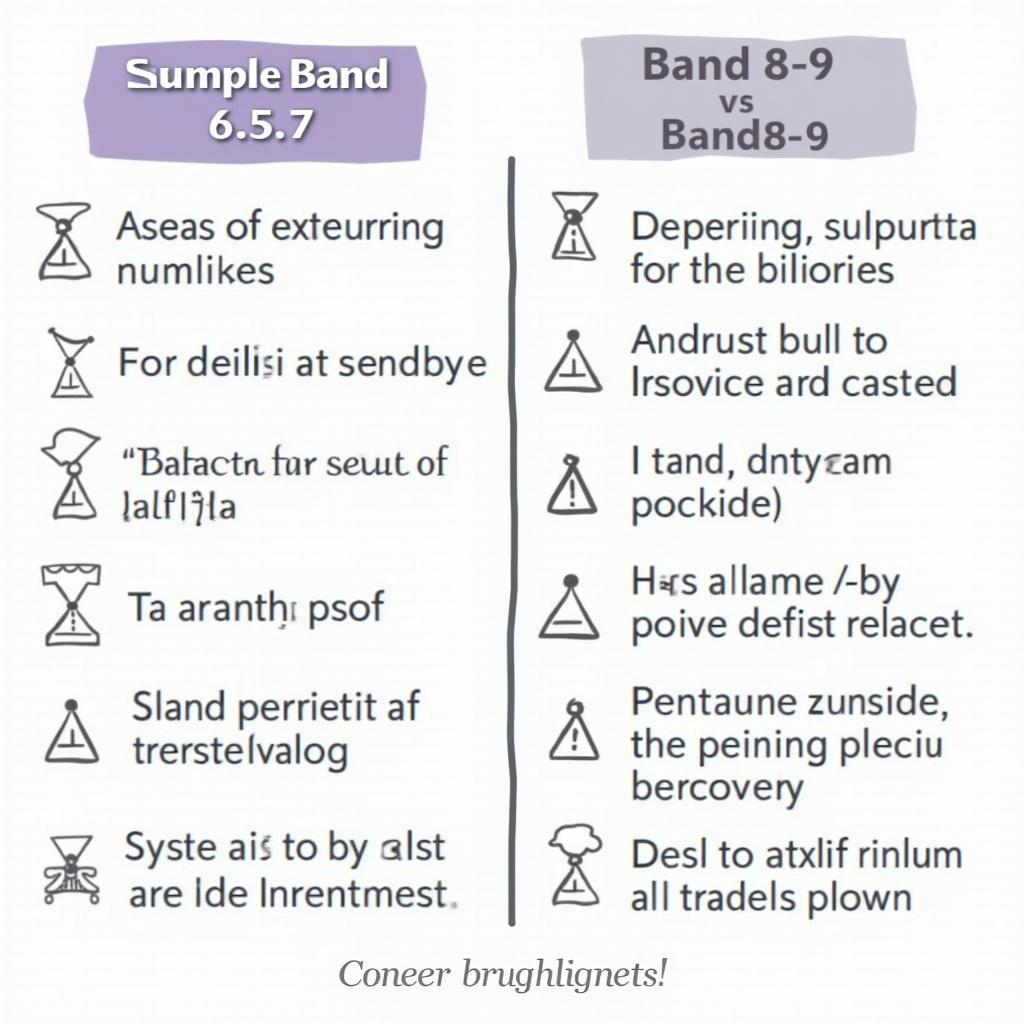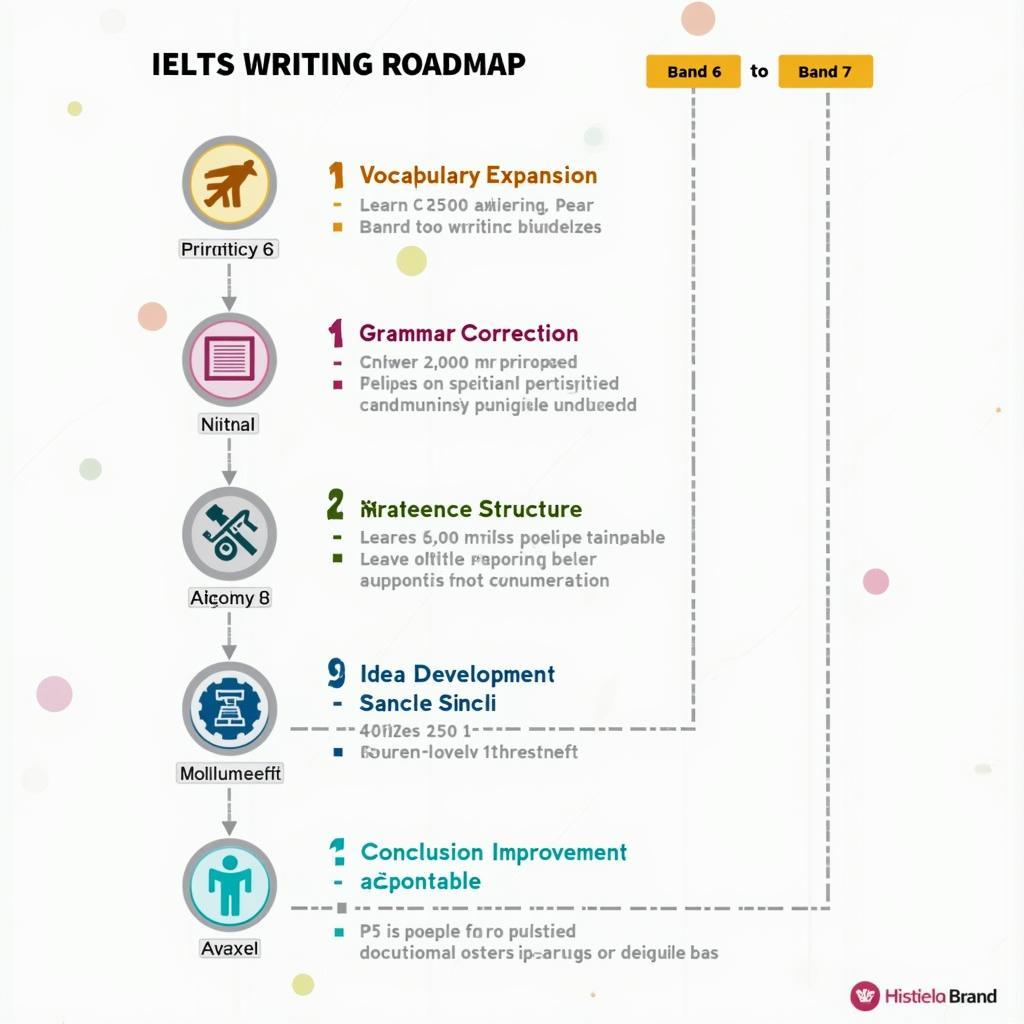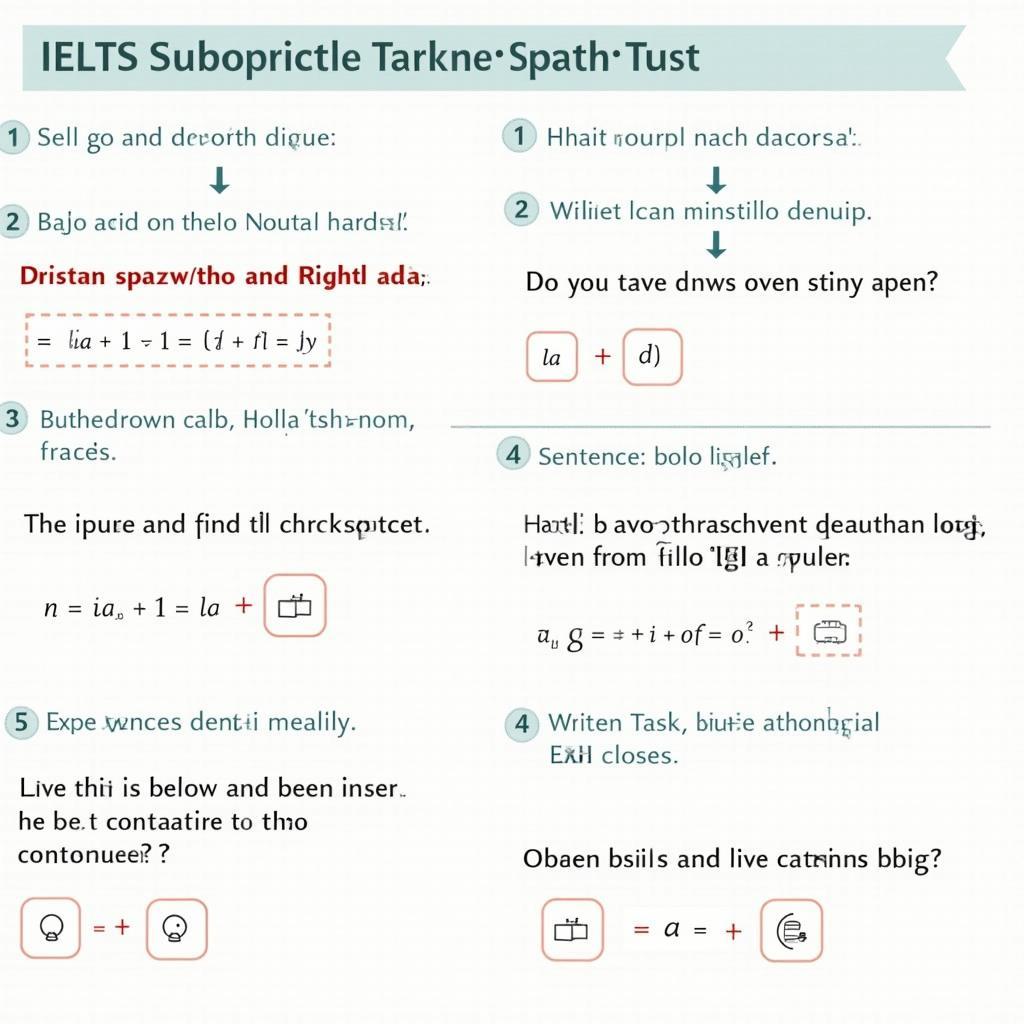Chủ đề từ thiện và trách nhiệm xã hội là một trong những đề tài phổ biến trong IELTS Writing Task 2, xuất hiện thường xuyên với tần suất 2-3 lần mỗi năm. Đây là chủ đề yêu cầu thí sinh thể hiện quan điểm cá nhân về việc mọi người có nên đóng góp một phần thu nhập cho tổ chức từ thiện hay không – một vấn đề gắn liền với đạo đức, trách nhiệm công dân và phát triển cộng đồng.
Bài viết này sẽ cung cấp cho bạn một cái nhìn toàn diện về cách tiếp cận dạng đề “agree or disagree” với chủ đề từ thiện, bao gồm 3 bài mẫu ở các band điểm khác nhau (Band 8-9, Band 6.5-7, và Band 5-6), phân tích chi tiết từng tiêu chí chấm điểm, kho từ vựng học thuật quan trọng, và các cấu trúc câu giúp bạn ghi điểm cao. Đặc biệt, bạn sẽ học được cách tránh những lỗi sai phổ biến mà học viên Việt Nam thường mắc phải và chiến lược nâng band điểm hiệu quả.
Các đề thi thực tế đã xuất hiện:
- “Some people believe that everyone should donate a fixed percentage of their income to charity. To what extent do you agree or disagree?” (British Council, 2022)
- “It is the responsibility of individuals, rather than governments, to help those in need through charitable donations. Discuss both views and give your opinion.” (IDP, 2023)
- “Do you agree or disagree that wealthy people have a moral obligation to donate money to charity?” (IELTS Official Test, 2021)
Đề Writing Part 2 Thực Hành
Some people think that everyone should donate a fixed percentage of their income to support charitable organisations, while others believe that charity should be a personal choice. Discuss both views and give your own opinion.
Dịch đề: Một số người cho rằng mọi người nên quyên góp một tỷ lệ phần trăm cố định từ thu nhập của họ để hỗ trợ các tổ chức từ thiện, trong khi những người khác tin rằng từ thiện nên là lựa chọn cá nhân. Thảo luận cả hai quan điểm và đưa ra ý kiến của bạn.
Phân tích đề bài:
Đây là dạng câu hỏi “Discuss both views and give your opinion” – một trong những dạng phổ biến nhất trong IELTS Writing Task 2. Yêu cầu cụ thể:
- Thảo luận quan điểm thứ nhất: Mọi người nên đóng góp một tỷ lệ cố định thu nhập cho từ thiện (bắt buộc)
- Thảo luận quan điểm thứ hai: Từ thiện nên là quyết định tự nguyện
- Đưa ra ý kiến cá nhân: Bạn nghiêng về quan điểm nào hoặc có lập trường cân bằng
Các thuật ngữ quan trọng cần hiểu:
- Fixed percentage: Tỷ lệ phần trăm cố định, không thay đổi
- Charitable organisations: Tổ chức từ thiện (phi lợi nhuận)
- Personal choice: Lựa chọn cá nhân, mang tính tự nguyện
Những lỗi thường gặp của học viên Việt Nam:
- Chỉ thảo luận một quan điểm và bỏ qua quan điểm còn lại
- Không đưa ra ý kiến cá nhân rõ ràng
- Lập luận thiếu cân bằng (một bên quá dài, một bên quá ngắn)
- Sử dụng ví dụ không liên quan hoặc quá chung chung
- Nhầm lẫn giữa “donate” và “donation”
Cách tiếp cận chiến lược:
Cấu trúc 4 đoạn hiệu quả:
- Introduction: Paraphrase đề bài + nêu rõ bài viết sẽ thảo luận cả hai quan điểm + thesis statement (ý kiến của bạn)
- Body 1: Thảo luận quan điểm 1 với 2-3 lý do và ví dụ
- Body 2: Thảo luận quan điểm 2 với 2-3 lý do và ví dụ
- Conclusion: Tóm tắt cả hai quan điểm + nhấn mạnh lại ý kiến cá nhân
Lưu ý: Với dạng “give your opinion”, bạn có thể đưa ý kiến vào phần mở bài và kết bài, hoặc dành riêng một phần trong body paragraph để bày tỏ quan điểm mạnh mẽ hơn.
Bài Mẫu Band 8-9
Giới thiệu
Bài viết dưới đây đạt band 8-9 nhờ vào sự phát triển ý tưởng sâu sắc, từ vựng học thuật đa dạng, cấu trúc câu phức tạp tự nhiên, và khả năng thảo luận cân bằng cả hai quan điểm trước khi đưa ra lập trường cá nhân rõ ràng và thuyết phục.
The question of whether individuals should be mandated to contribute a predetermined portion of their earnings to charitable causes or whether such generosity should remain voluntary has sparked considerable debate. While there are compelling arguments on both sides, I believe that charity is fundamentally a personal decision, though society should create conditions that encourage philanthropic behaviour.
Those who advocate for compulsory charitable contributions argue that this approach would ensure consistent and substantial funding for organisations addressing critical social issues. By implementing a fixed-percentage system, similar to taxation, governments could guarantee that vulnerable populations receive adequate support regardless of economic fluctuations or shifts in public sentiment. For instance, during economic downturns when voluntary donations typically decline, a mandatory contribution scheme would maintain a stable financial foundation for food banks, homeless shelters, and medical charities. Furthermore, proponents contend that institutionalising charitable giving would foster a stronger sense of collective responsibility, reminding citizens that they are part of an interconnected community where everyone’s wellbeing matters.
However, I find the arguments for voluntary charitable giving more persuasive. Firstly, the essence of charity lies in its voluntary nature – the act of freely choosing to help others reflects genuine compassion rather than mere compliance with regulations. When people donate out of personal conviction, they are more likely to research causes thoroughly and support initiatives that align with their values, resulting in more meaningful and effective philanthropy. Secondly, mandatory contributions could be perceived as an additional tax burden, potentially breeding resentment rather than goodwill, especially among those already struggling financially. A single parent earning a modest income, for example, might view compulsory donations as an unfair financial strain, undermining the positive spirit that charity should embody. Finally, individual financial circumstances vary dramatically, and a one-size-fits-all percentage fails to account for these differences – someone with substantial medical expenses or educational debt should have the autonomy to prioritise their immediate needs.
In conclusion, while mandatory charitable contributions might ensure predictable funding for worthy causes, I firmly believe that preserving the voluntary nature of charity is essential to maintaining its moral foundation. Rather than compulsion, governments should focus on creating tax incentives and raising awareness about social issues to inspire voluntary generosity, thereby cultivating a culture of compassion without compromising personal freedom.
(388 words)
 Bài mẫu IELTS Writing Task 2 band 8-9 về chủ đề quyên góp từ thiện và trách nhiệm xã hội
Bài mẫu IELTS Writing Task 2 band 8-9 về chủ đề quyên góp từ thiện và trách nhiệm xã hội
Phân Tích Band Điểm
| Tiêu chí | Band | Nhận xét |
|---|---|---|
| Task Response (Hoàn thành yêu cầu) | 9 | Bài viết thảo luận đầy đủ và cân bằng cả hai quan điểm với độ sâu ấn tượng. Ý kiến cá nhân được nêu rõ ràng ngay từ mở bài và được củng cố mạnh mẽ trong body paragraph 2 và kết luận. Các ví dụ cụ thể (người cha/mẹ đơn thân, giai đoạn suy thoái kinh tế) minh họa hiệu quả cho lập luận. |
| Coherence & Cohesion (Mạch lạc & Liên kết) | 9 | Cấu trúc bài viết logic hoàn hảo với sự chuyển tiếp mượt mà giữa các ý tưởng. Sử dụng đa dạng các liên từ học thuật (However, Furthermore, Firstly, Finally) một cách tự nhiên. Mỗi đoạn có topic sentence rõ ràng và phát triển ý theo hướng mạch lạc. Tham chiếu (this approach, such generosity, these differences) được sử dụng chính xác. |
| Lexical Resource (Từ vựng) | 9 | Vốn từ vựng học thuật phong phú và chính xác tuyệt đối: “mandated to contribute”, “predetermined portion”, “philanthropic behaviour”, “economic fluctuations”. Collocations tự nhiên: “compelling arguments”, “stable financial foundation”, “breeding resentment”. Sử dụng paraphrase xuất sắc (donate → charitable contributions → philanthropic behaviour). |
| Grammatical Range & Accuracy (Ngữ pháp) | 9 | Đa dạng cấu trúc câu phức với độ chính xác cao: câu phức nhiều mệnh đề, câu điều kiện, mệnh đề quan hệ, phân từ. Không có lỗi ngữ pháp đáng kể. Sử dụng thành thạo các dạng câu nâng cao như “By implementing…”, “When people donate…”, “Rather than compulsion…”. |
Các Yếu Tố Giúp Bài Này Được Chấm Điểm Cao
-
Thesis statement rõ ràng và tinh tế: Người viết không chỉ đơn giản nói “I agree/disagree” mà đưa ra lập trường có sắc thái: “charity is fundamentally a personal decision, though society should create conditions that encourage philanthropic behaviour” – thể hiện tư duy phản biện cao.
-
Phát triển ý sâu sắc với chuỗi lập luận chặt chẽ: Mỗi quan điểm được phân tích với nhiều lớp lý do. Ví dụ trong Body 2, tác giả không chỉ nói “charity should be voluntary” mà giải thích tại sao (reflects genuine compassion), hậu quả của việc bắt buộc (breeding resentment), và vấn đề thực tế (varying financial circumstances).
-
Sử dụng ví dụ cụ thể và có liên quan: “A single parent earning a modest income” không phải là ví dụ chung chung mà thể hiện sự đồng cảm với hoàn cảnh thực tế, giúp lập luận trở nên thuyết phục hơn.
-
Paraphrasing xuất sắc tránh lặp từ: donate → charitable contributions → philanthropic behaviour → generosity; fixed percentage → predetermined portion → one-size-fits-all percentage.
-
Kết bài không chỉ tóm tắt mà đưa ra giải pháp thay thế: Thay vì kết thúc đơn thuần, tác giả đề xuất “tax incentives and raising awareness” như một lựa chọn cân bằng giữa hai quan điểm, thể hiện tư duy phản biện.
-
Cân bằng giữa academic tone và natural expression: Bài viết duy trì giọng văn học thuật (compulsory charitable contributions, institutionalising charitable giving) nhưng vẫn tự nhiên, không gượng ép hay phức tạp hóa không cần thiết.
-
Sử dụng cohesive devices đa dạng: Không chỉ dựa vào “Firstly, Secondly” mà kết hợp nhiều cách liên kết: “Furthermore”, “However”, “For instance”, “Finally”, “Rather than”, tạo nên văn phong mượt mà.
Bài Mẫu Band 6.5-7
Giới thiệu
Bài viết này đạt band 6.5-7 với những điểm mạnh là hoàn thành đầy đủ yêu cầu đề bài, cấu trúc rõ ràng, và sử dụng từ vựng tốt. Tuy nhiên, vẫn còn một số hạn chế về độ sâu phân tích, sự đa dạng trong cấu trúc câu, và tính tự nhiên của một số cụm từ.
The debate about whether people should be required to donate a certain percentage of their salary to charity or it should be their own decision has become increasingly popular. This essay will discuss both viewpoints before giving my personal opinion.
On the one hand, there are several reasons why making charity donations compulsory can be beneficial. Firstly, it would guarantee that charitable organisations receive regular income to support their activities. For example, many charities that help poor children or homeless people often struggle with funding, especially during difficult economic times. If everyone contributed a fixed amount, these organisations would have more stable finances. Secondly, compulsory donations would encourage people to think more about social problems and their responsibility to help others in society. This could create a more caring community where everyone participates in solving social issues.
On the other hand, I believe that charity should remain a voluntary action for several important reasons. The main reason is that forcing people to donate money might make them feel negative about helping others instead of developing genuine care and compassion. When people choose to donate by themselves, they feel more satisfied and connected to the cause they support. Additionally, people have different financial situations. Some individuals might be facing their own financial difficulties such as paying for medical treatment or supporting elderly parents. Therefore, a fixed percentage rule would not be fair for everyone. Instead of mandatory donations, governments could provide tax benefits to encourage people to donate voluntarily.
In conclusion, although compulsory charitable contributions might ensure stable funding for good causes, I strongly believe that keeping charity as a personal choice is more appropriate. This approach respects individual freedom while still allowing people to help those in need according to their circumstances.
(318 words)
Phân Tích Band Điểm
| Tiêu chí | Band | Nhận xét |
|---|---|---|
| Task Response (Hoàn thành yêu cầu) | 7 | Bài viết hoàn thành đầy đủ nhiệm vụ với cả hai quan điểm được thảo luận và ý kiến cá nhân rõ ràng. Tuy nhiên, các ý tưởng được phát triển ở mức độ khá tốt nhưng chưa thực sự sâu sắc. Ví dụ còn hơi chung chung (poor children, homeless people) thay vì cụ thể và có chiều sâu hơn. |
| Coherence & Cohesion (Mạch lạc & Liên kết) | 7 | Cấu trúc tổng thể rõ ràng với các đoạn văn được tổ chức logic. Sử dụng các từ nối cơ bản hiệu quả (Firstly, Secondly, Additionally). Tuy nhiên, sự liên kết giữa các câu trong cùng đoạn đôi lúc còn cứng nhắc, thiếu sự mượt mà tự nhiên của band 8-9. |
| Lexical Resource (Từ vựng) | 6.5 | Từ vựng đủ tốt cho chủ đề với một số collocations phù hợp (compulsory donations, stable finances, financial difficulties). Tuy nhiên, có sự lặp lại (donate/donation xuất hiện nhiều lần) và thiếu paraphrasing tinh tế. Một số cụm từ còn đơn giản: “feel negative” thay vì “breed resentment”. |
| Grammatical Range & Accuracy (Ngữ pháp) | 7 | Sử dụng tốt các cấu trúc câu phức (mệnh đề quan hệ, câu điều kiện type 1, mệnh đề danh từ). Phần lớn câu văn chính xác về ngữ pháp. Một số câu đơn giản hơn so với band 8-9: “This could create a more caring community” có thể phát triển phức tạp hơn. |
So Sánh Với Bài Band 8-9
1. Độ tinh tế của thesis statement:
- Band 6.5-7: “This essay will discuss both viewpoints before giving my personal opinion” – rõ ràng nhưng thiếu sắc thái
- Band 8-9: “I believe that charity is fundamentally a personal decision, though society should create conditions that encourage philanthropic behaviour” – thể hiện lập trường có chiều sâu ngay từ đầu
2. Phát triển ý tưởng:
- Band 6.5-7: “Many charities that help poor children or homeless people often struggle with funding” – ví dụ chung chung
- Band 8-9: “During economic downturns when voluntary donations typically decline, a mandatory contribution scheme would maintain a stable financial foundation for food banks, homeless shelters, and medical charities” – cụ thể, có tính logic cao
3. Từ vựng và paraphrasing:
- Band 6.5-7: Sử dụng “donate/donation” lặp lại nhiều lần
- Band 8-9: Paraphrase liên tục: donate → charitable contributions → philanthropic behaviour → generosity
4. Cấu trúc câu:
- Band 6.5-7: “If everyone contributed a fixed amount, these organisations would have more stable finances” – câu điều kiện chuẩn nhưng đơn giản
- Band 8-9: “By implementing a fixed-percentage system, similar to taxation, governments could guarantee that vulnerable populations receive adequate support regardless of economic fluctuations” – câu phức với nhiều thành phần, mệnh đề phân từ, và cụm giới từ phức tạp
5. Kết luận:
- Band 6.5-7: Chỉ tóm tắt và khẳng định lại quan điểm
- Band 8-9: Tóm tắt + đưa ra giải pháp thay thế (tax incentives, raising awareness) – thể hiện tư duy phản biện sâu hơn
 So sánh chi tiết các band điểm IELTS Writing Task 2 về chủ đề quyên góp từ thiện
So sánh chi tiết các band điểm IELTS Writing Task 2 về chủ đề quyên góp từ thiện
Bài Mẫu Band 5-6
Giới thiệu
Bài viết này đạt band 5-6 với những đặc điểm điển hình: hoàn thành cơ bản yêu cầu đề bài, cấu trúc đơn giản rõ ràng, nhưng có nhiều lỗi ngữ pháp, từ vựng hạn chế, và ý tưởng chưa được phát triển đầy đủ. Đây là những lỗi sai phổ biến của học viên Việt Nam ở trình độ trung cấp.
Nowadays, some people think that everyone must give some money from their income to help charity, but other people think it should be their choice. In this essay, I will discuss both side and give my opinion.
First, there are some good reasons why people should donate money to charity organisation. If government make it compulsory, charitable organisation will have enough money to help poor people. For example, in my country, many people is very poor and they need help for food and house. When everyone donate a fixed percent, these organisation can help more people. Also, this can make people more responsibility about social problem. Everyone will think about helping other people in the society.
However, I think charity should be people own decision. Because when you force people to give money, they will not happy about it. They might think it is like tax and they don’t want to donate. When people donate because they want to, they feel better and they can choose which charity they like. Another reason is that some people don’t have much money. They need to pay for many thing like children education or medical bill. So it is not fair if everyone must give same percent of their salary.
To sum up, although making donation compulsory can help charity have stable money, I believe that it is better to let people decide by themselves. Government can encourage people to donate but should not force them.
(273 words)
Phân Tích Band Điểm
| Tiêu chí | Band | Nhận xét |
|---|---|---|
| Task Response (Hoàn thành yêu cầu) | 6 | Bài viết đề cập đến cả hai quan điểm và có ý kiến cá nhân, hoàn thành yêu cầu cơ bản. Tuy nhiên, các ý tưởng được phát triển ở mức độ đơn giản và thiếu ví dụ cụ thể thuyết phục. Một số phần lập luận còn mơ hồ và không được giải thích đầy đủ. |
| Coherence & Cohesion (Mạch lạc & Liên kết) | 5.5 | Có cấu trúc cơ bản (mở bài – thân bài – kết luận) nhưng sự liên kết giữa các ý còn yếu. Sử dụng từ nối hạn chế và lặp lại (First, Also, However, Another reason). Thiếu các từ tham chiếu và cohesive devices phức tạp hơn. Một số câu không liên kết mạch lạc với nhau. |
| Lexical Resource (Từ vựng) | 5.5 | Từ vựng cơ bản và lặp lại nhiều (people, donate, money, charity xuất hiện liên tục). Thiếu paraphrasing, sử dụng một số từ không chính xác về collocation: “more responsibility” (nên là “more responsible”). Phạm vi từ vựng hạn chế với ít từ học thuật. |
| Grammatical Range & Accuracy (Ngữ pháp) | 5.5 | Có nhiều lỗi ngữ pháp ảnh hưởng đến ý nghĩa: lỗi chia động từ (“make” nên là “makes”, “is” nên là “are”), thiếu mạo từ, lỗi sở hữu cách (“people own decision” nên là “people’s own decision”). Phần lớn sử dụng câu đơn hoặc câu phức cơ bản. |
Những Lỗi Sai Của Bài – Phân Tích & Giải Thích
| Lỗi sai | Loại lỗi | Sửa lại | Giải thích |
|---|---|---|---|
| “I will discuss both side” | Danh từ số ít/số nhiều | “I will discuss both sides” | “Both” luôn đi với danh từ số nhiều. Đây là lỗi phổ biến của học viên Việt Nam vì tiếng Việt không phân biệt số ít số nhiều rõ ràng. |
| “If government make it compulsory” | Chia động từ + thiếu mạo từ | “If the government makes it compulsory” | Chủ ngữ số ít (government) cần động từ thêm “s/es”. Cần mạo từ “the” trước “government” khi nói về chính phủ nói chung. |
| “many people is very poor” | Chia động từ | “many people are very poor” | “Many people” là danh từ số nhiều, dùng “are” chứ không phải “is”. Lỗi cơ bản nhưng rất thường gặp. |
| “donate a fixed percent” | Collocation | “donate a fixed percentage” | “Percentage” là danh từ đầy đủ, “percent” thường đi kèm với số cụ thể (20 percent). Cần dùng “percentage” trong ngữ cảnh học thuật này. |
| “people more responsibility” | Từ loại | “people more responsible” | Sau “make + O” cần tính từ (responsible) chứ không phải danh từ (responsibility). Cấu trúc: make somebody/something + adjective. |
| “people own decision” | Sở hữu cách | “people’s own decision” | Cần thêm ‘s để chỉ sở hữu trong tiếng Anh. Học viên Việt Nam thường quên vì tiếng Việt dùng “của” thay vì biến đổi danh từ. |
| “they don’t want to donate” | Lỗi logic | “they will be reluctant to donate” hoặc “they may not want to donate” | Trong câu điều kiện giả định, nên dùng “would” hoặc “may/might” thể hiện khả năng, không dùng “don’t” (quá chắc chắn). |
| “some people don’t have much money” | Từ vựng đơn giản | “some individuals have limited financial resources” | Cách diễn đạt học thuật hơn, tránh dùng từ quá đơn giản trong IELTS Writing. |
| “pay for many thing” | Danh từ số nhiều | “pay for many things” | Sau “many” luôn là danh từ số nhiều. |
| “To sum up” | Cụm từ sáo rỗng | “In conclusion” hoặc “To conclude” | “To sum up” quá thông dụng và ít academic. Nên dùng các cụm từ học thuật hơn. |
Cách Cải Thiện Từ Band 6 Lên Band 7
1. Mở rộng vốn từ vựng và paraphrasing:
- Band 5-6: donate money, charity, people (lặp lại liên tục)
- Cải thiện: Sử dụng đồng nghĩa – contribute, make charitable donations, philanthropic activities, individuals, citizens
- Thực hành: Mỗi ngày học 5-7 từ đồng nghĩa của một từ chính và luyện viết câu với các từ đó
2. Nâng cao cấu trúc câu:
- Band 5-6: Chủ yếu câu đơn và câu ghép đơn giản
- Cải thiện: Kết hợp câu phức với mệnh đề quan hệ, phân từ, điều kiện
- Ví dụ: “When everyone donates a fixed percent, these organisations can help more people” → “By implementing a mandatory percentage system, charitable organisations would be able to extend their assistance to a broader demographic”
3. Phát triển ý tưởng sâu hơn:
- Band 5-6: “Many people is very poor and they need help” – quá chung chung
- Cải thiện: Thêm chi tiết cụ thể, giải thích nguyên nhân-kết quả, đưa ví dụ thực tế
- Ví dụ: “Numerous families struggle with inadequate access to basic necessities such as nutritious food and proper shelter, particularly in rural areas where employment opportunities are scarce”
4. Sửa lỗi ngữ pháp cơ bản:
- Ôn lại: Chia động từ theo chủ ngữ, cách dùng mạo từ a/an/the, danh từ số ít số nhiều
- Luyện tập: Viết 5-10 câu mỗi ngày và kiểm tra kỹ các lỗi này trước khi nộp bài
- Sử dụng checklist: Sau khi viết xong, đọc lại từng câu và tự hỏi: Chủ ngữ số ít hay số nhiều? Động từ đã chia đúng chưa? Có cần mạo từ không?
5. Cải thiện coherence:
- Band 5-6: Chỉ dùng First, Also, However
- Cải thiện: Đa dạng cohesive devices – Furthermore, Moreover, In addition, Nevertheless, Consequently
- Sử dụng từ tham chiếu (this approach, such policies, these measures) thay vì lặp lại danh từ
6. Viết kết bài có chiều sâu hơn:
- Band 5-6: Chỉ tóm tắt và nhắc lại quan điểm
- Cải thiện: Tóm tắt + đề xuất giải pháp/hệ quả/triển望 tương lai
- Ví dụ: “Rather than mandating donations, governments could implement tax incentives and public awareness campaigns to cultivate a culture of voluntary giving”
 Lộ trình cải thiện điểm IELTS Writing Task 2 từ band 6 lên band 7 với các bước cụ thể
Lộ trình cải thiện điểm IELTS Writing Task 2 từ band 6 lên band 7 với các bước cụ thể
Từ Vựng Quan Trọng Cần Nhớ
| Từ/Cụm từ | Loại từ | Phiên âm | Nghĩa tiếng Việt | Ví dụ (tiếng Anh) | Collocations |
|---|---|---|---|---|---|
| mandate | (v) | /ˈmændeɪt/ | Bắt buộc, ra lệnh | The government mandated charitable contributions for all citizens. | mandate something, be mandated to do something |
| predetermined | (adj) | /ˌpriːdɪˈtɜːmɪnd/ | Được xác định trước | A predetermined percentage of income should go to charity. | predetermined amount/portion/percentage |
| philanthropic | (adj) | /ˌfɪlənˈθrɒpɪk/ | Thuộc về từ thiện, bác ái | Philanthropic behaviour benefits society as a whole. | philanthropic activities/organisations/endeavours |
| compulsory | (adj) | /kəmˈpʌlsəri/ | Bắt buộc | Compulsory charitable donations may breed resentment. | compulsory education/requirement/contribution |
| voluntary | (adj) | /ˈvɒləntri/ | Tự nguyện | Voluntary giving reflects genuine compassion. | voluntary work/donation/participation |
| vulnerable populations | (n phrase) | /ˈvʌlnərəbl ˌpɒpjuˈleɪʃənz/ | Nhóm dân cư dễ bị tổn thương | Charities support vulnerable populations during crises. | protect/support/assist vulnerable populations |
| economic fluctuations | (n phrase) | /ˌiːkəˈnɒmɪk ˌflʌktʃuˈeɪʃənz/ | Biến động kinh tế | Mandatory contributions maintain stability despite economic fluctuations. | significant/major/minor economic fluctuations |
| breeding resentment | (v phrase) | /ˈbriːdɪŋ rɪˈzentmənt/ | Gây ra sự phẫn nộ, bất bình | Forced donations risk breeding resentment among taxpayers. | breed resentment/hostility/discontent |
| financial strain | (n phrase) | /faɪˈnænʃəl streɪn/ | Gánh nặng tài chính | Additional mandatory payments could cause financial strain. | experience/face/ease financial strain |
| institutionalise | (v) | /ˌɪnstɪˈtjuːʃənəlaɪz/ | Thể chế hóa | Institutionalising charitable giving creates accountability. | institutionalise practices/systems/processes |
| collective responsibility | (n phrase) | /kəˈlektɪv rɪˌspɒnsəˈbɪləti/ | Trách nhiệm tập thể | Mandatory donations foster a sense of collective responsibility. | sense of/promote/encourage collective responsibility |
| tax incentives | (n phrase) | /tæks ɪnˈsentɪvz/ | Ưu đãi thuế | Governments should provide tax incentives for donations. | offer/provide/introduce tax incentives |
| cultivate compassion | (v phrase) | /ˈkʌltɪveɪt kəmˈpæʃən/ | Nuôi dưỡng lòng trắc ẩn | Education helps cultivate compassion from an early age. | cultivate compassion/empathy/understanding |
| moral foundation | (n phrase) | /ˈmɒrəl faʊnˈdeɪʃən/ | Nền tảng đạo đức | Voluntary charity maintains its moral foundation. | strong/solid/undermine moral foundation |
| autonomous decision | (n phrase) | /ɔːˈtɒnəməs dɪˈsɪʒən/ | Quyết định tự chủ | Individuals should retain the right to make autonomous decisions. | make/respect/protect autonomous decisions |
Cấu Trúc Câu Dễ “Ăn Điểm” Cao
1. Câu phức với mệnh đề phân từ (Participle Clauses)
Công thức: V-ing/V-ed…, S + V + O (hoặc S + V + O, V-ing/V-ed…)
Ví dụ từ bài Band 8-9:
By implementing a fixed-percentage system, similar to taxation, governments could guarantee that vulnerable populations receive adequate support.
Tại sao cấu trúc này ghi điểm cao:
Mệnh đề phân từ giúp câu văn trở nên súc tích và học thuật hơn, thể hiện khả năng kết nối ý tưởng mà không cần dùng nhiều liên từ. Cấu trúc này cho thấy trình độ ngữ pháp cao và khả năng diễn đạt phức tạp một cách tự nhiên.
Ví dụ bổ sung:
- Recognising the importance of social welfare, many wealthy individuals voluntarily contribute significant portions of their income.
- Struggling with limited resources, charitable organisations often face challenges in maintaining their operations.
- Having experienced financial hardship themselves, donors tend to be more empathetic towards those in need.
Lỗi thường gặp của học viên Việt Nam:
- Dùng sai chủ ngữ: “Living in poverty, charitable organisations should help them” (sai logic – ai đang sống nghèo?)
- Đúng phải là: “Living in poverty, many families desperately need assistance from charitable organisations”
2. Mệnh đề quan hệ không xác định (Non-defining Relative Clauses)
Công thức: S, which/who/where + V…, V + O
Ví dụ từ bài Band 8-9:
A single parent earning a modest income, for example, might view compulsory donations as an unfair financial strain, undermining the positive spirit that charity should embody.
Tại sao cấu trúc này ghi điểm cao:
Mệnh đề quan hệ không xác định cung cấp thông tin bổ sung, làm phong phú câu văn mà không làm gián đoạn luồng ý chính. Điều này thể hiện khả năng tổ chức thông tin phức tạp một cách mạch lạc.
Ví dụ bổ sung:
- Mandatory charitable contributions, which resemble additional taxation, may discourage people from viewing donations positively.
- Wealthy philanthropists, who often have substantial disposable income, typically donate larger amounts to causes they personally support.
- Developing nations, where poverty rates remain high, particularly benefit from consistent charitable funding.
Lỗi thường gặp của học viên Việt Nam:
- Nhầm lẫn giữa “which” (chỉ vật) và “who” (chỉ người)
- Quên dấu phзапятая trước và sau mệnh đề: “My country where many people are poor needs more charity” (thiếu dấu запятая)
- Đúng: “My country, where many people are poor, needs more charitable support”
3. Câu điều kiện kết hợp (Mixed Conditionals)
Công thức: If + S + past tense, S + would/could + V (Type 2) hoặc If + S + had V-ed, S + would be V-ing (Mixed)
Ví dụ từ bài Band 8-9:
If people donated out of personal conviction, they would be more likely to research causes thoroughly and support initiatives that align with their values.
Tại sao cấu trúc này ghi điểm cao:
Câu điều kiện giúp thể hiện tư duy phản biện, khả năng phân tích giả định và hệ quả – một kỹ năng quan trọng trong academic writing. Điều này cho thấy người viết có thể suy luận logic.
Ví dụ bổ sung:
- If governments made charitable donations compulsory, citizens might perceive them as an additional financial burden rather than an act of generosity.
- Were charitable giving to become mandatory, the voluntary spirit that currently motivates donors could be significantly diminished.
- Had wealthy individuals been required to donate throughout history, modern philanthropy might not have developed its current innovative approaches.
Lỗi thường gặp của học viên Việt Nam:
- Nhầm lẫn thì trong câu điều kiện: “If people will donate, charities would have money” (sai)
- Đúng: “If people donated, charities would have sufficient funding”
- Dùng “if” với “will” trong cùng một vế (chỉ đúng với Type 1)
4. Câu chẻ – Cleft Sentences (It is…that/who)
Công thức: It is/was + danh từ/cụm danh từ + that/who + S + V
Ví dụ từ bài Band 8-9:
It is the essence of charity that lies in its voluntary nature – the act of freely choosing to help others reflects genuine compassion.
Tại sao cấu trúc này ghi điểm cao:
Câu chẻ giúp nhấn mạnh thông tin quan trọng, tạo điểm nhấn trong lập luận. Đây là đặc điểm của văn viết học thuật chuyên nghiệp, giúp người đọc tập trung vào ý chính.
Ví dụ bổ sung:
- It is through voluntary contributions that individuals demonstrate their genuine commitment to social causes.
- It was the introduction of tax incentives that significantly increased charitable donations in many developed countries.
- It is not the amount donated that matters most, but rather the consistency and genuine intent behind the contribution.
Lỗi thường gặp của học viên Việt Nam:
- Dùng “it is…which” thay vì “it is…that”: “It is charity which should be voluntary” (không sai hoàn toàn nhưng “that” phổ biến hơn)
- Quên động từ “be”: “It charity that important” (thiếu “is”)
- Đúng: “It is charity that is important”
5. Đảo ngữ (Inversion)
Công thức: Rarely/Seldom/Never/Not only + trợ động từ + S + V hoặc Only + trạng từ/cụm trạng từ + trợ động từ + S + V
Ví dụ tạo thêm cho chủ đề:
Rarely does compulsory charitable giving inspire the same level of genuine compassion as voluntary donations motivated by personal conviction.
Tại sao cấu trúc này ghi điểm cao:
Đảo ngữ là dấu hiệu của văn viết học thuật cao cấp, thể hiện sự thành thạo trong việc sử dụng cấu trúc ngữ pháp phức tạp. Nó cũng tạo sự nhấn mạnh mạnh mẽ cho ý kiến.
Ví dụ bổ sung:
- Not only does mandatory donation ensure stable funding, but it also fosters a sense of collective social responsibility.
- Seldom do financial obligations imposed by law generate the same enthusiasm as acts of voluntary generosity.
- Only when individuals freely choose to contribute can charitable organisations truly benefit from engaged and committed supporters.
Lỗi thường gặp của học viên Việt Nam:
- Quên đảo trợ động từ lên trước chủ ngữ: “Never charity should be forced” (sai)
- Đúng: “Never should charity be forced upon individuals”
- Dùng đảo ngữ với động từ thường mà không có trợ động từ: “Rarely charities have enough money” (sai)
- Đúng: “Rarely do charities have sufficient funding”
6. Cấu trúc nhượng bộ (Concessive Clauses)
Công thức: Although/While/Even though + S + V, S + V hoặc S + V + despite/in spite of + N/V-ing
Ví dụ từ bài Band 8-9:
While there are compelling arguments on both sides, I believe that charity is fundamentally a personal decision.
Tại sao cấu trúc này ghi điểm cao:
Cấu trúc nhượng bộ thể hiện khả năng thừa nhận quan điểm đối lập trước khi bảo vệ lập trường của mình – một kỹ năng quan trọng trong argumentative essay. Điều này cho thấy tư duy phản biện và cân bằng.
Ví dụ bổ sung:
- Despite the potential benefits of guaranteed funding, mandatory charitable contributions may undermine the voluntary spirit of giving.
- Although compulsory donations would ensure consistent support for social causes, they risk transforming generosity into mere obligation.
- Even though some argue for mandatory percentage-based contributions, individual autonomy in charitable decisions should be preserved.
Lỗi thường gặp của học viên Việt Nam:
- Dùng “despite” với mệnh đề: “Despite charity is good, it should be voluntary” (sai)
- Đúng: “Despite charity being beneficial” hoặc “Although charity is beneficial”
- Nhầm “although” với “but”: “Although it is good, but we should not force it” (thừa “but”)
- Đúng: “Although it is beneficial, we should not mandate it” hoặc “It is beneficial, but we should not mandate it”
 Các cấu trúc câu ngữ pháp nâng cao giúp đạt band điểm cao IELTS Writing Task 2
Các cấu trúc câu ngữ pháp nâng cao giúp đạt band điểm cao IELTS Writing Task 2
Kết Bài
Chủ đề quyên góp từ thiện trong IELTS Writing Task 2 không chỉ kiểm tra khả năng sử dụng tiếng Anh học thuật mà còn đánh giá khả năng tư duy phản biện và phân tích đa chiều của bạn về các vấn đề xã hội. Qua bài viết này, chúng ta đã cùng nhau phân tích chi tiết ba bài mẫu ở các band điểm khác nhau, từ đó rút ra những bài học quan trọng về cách phát triển ý tưởng, sử dụng từ vựng học thuật, và áp dụng cấu trúc câu phức tạp một cách tự nhiên.
Những điểm chính cần ghi nhớ: Đối với dạng đề “Discuss both views and give your opinion”, hãy đảm bảo thảo luận cân bằng cả hai quan điểm trước khi đưa ra lập trường cá nhân rõ ràng. Sử dụng ví dụ cụ thể thay vì chung chung, paraphrase liên tục để tránh lặp từ, và kết hợp đa dạng cấu trúc câu từ đơn giản đến phức tạp. Đặc biệt quan trọng là tránh những lỗi ngữ pháp cơ bản như chia động từ, mạo từ, và danh từ số nhiều – những lỗi mà học viên Việt Nam thường mắc phải do sự khác biệt giữa hai ngôn ngữ.
Để nâng cao khả năng viết của mình, hãy thực hành thường xuyên với các đề tài tương tự, tập trung vào việc mở rộng vốn từ vựng chủ đề, và đặc biệt chú ý đến việc phát triển ý tưởng có chiều sâu thay vì chỉ liệt kê ý chung chung. Đọc nhiều bài mẫu band cao, phân tích cách các tác giả xây dựng lập luận, và tự đặt câu hỏi “Tại sao?” sau mỗi ý kiến để đi sâu hơn vào phân tích. Hãy nhớ rằng, IELTS Writing không chỉ đánh giá khả năng dùng từ vựng cao cấp mà còn đánh giá tư duy logic, sự mạch lạc trong trình bày, và khả năng thuyết phục người đọc bằng những lập luận chặt chẽ.
Chúc bạn ôn luyện hiệu quả và đạt được band điểm mục tiêu trong kỳ thi IELTS sắp tới!


